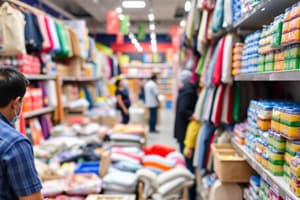Podcast
Questions and Answers
What is one main advantage of using an automatic vending machine for retailing?
What is one main advantage of using an automatic vending machine for retailing?
- It allows for real-time online transactions.
- It eliminates the need for physical inventory.
- It requires substantial initial investment.
- It can operate without human assistance. (correct)
Which type of retail trade is characterized by selling a variety of products under one roof?
Which type of retail trade is characterized by selling a variety of products under one roof?
- Multiple Shops
- Chain Stores
- Departmental Store (correct)
- Mail Order Business
Which statement correctly defines internet retailing?
Which statement correctly defines internet retailing?
- Providing services and products exclusively through mobile apps.
- Selling goods directly in physical stores.
- Transacting sales through online platforms. (correct)
- Engaging customers via telemarketing methods.
What is a key characteristic of multiple shops in retailing?
What is a key characteristic of multiple shops in retailing?
What is a potential challenge associated with retailing through automatic vending machines?
What is a potential challenge associated with retailing through automatic vending machines?
What is a primary advantage of Internet shopping?
What is a primary advantage of Internet shopping?
What is a disadvantage of using automatic vending machines?
What is a disadvantage of using automatic vending machines?
What is a key feature of departmental stores?
What is a key feature of departmental stores?
Which of the following describes the process of mail order shopping?
Which of the following describes the process of mail order shopping?
How do multiple shops benefit consumers?
How do multiple shops benefit consumers?
In what way are Super Bazars beneficial for customers?
In what way are Super Bazars beneficial for customers?
What is one key difference in location between departmental stores and multiple shops?
What is one key difference in location between departmental stores and multiple shops?
What is a characteristic of the pricing strategy in departmental stores?
What is a characteristic of the pricing strategy in departmental stores?
What is a major limitation of Internet shopping?
What is a major limitation of Internet shopping?
Why is tele shopping not widely used by consumers despite its convenience?
Why is tele shopping not widely used by consumers despite its convenience?
How do the goods offered in multiple shops differ from those in departmental stores?
How do the goods offered in multiple shops differ from those in departmental stores?
What common facility is not available at multiple shops?
What common facility is not available at multiple shops?
What distinguishes modern malls from traditional retail environments?
What distinguishes modern malls from traditional retail environments?
How do malls enhance the shopping experience for consumers?
How do malls enhance the shopping experience for consumers?
In what way can malls serve as venues beyond shopping?
In what way can malls serve as venues beyond shopping?
Which of the following is NOT a feature typically found in modern malls?
Which of the following is NOT a feature typically found in modern malls?
Flashcards
Internet Retailing
Internet Retailing
Selling goods or services over the internet.
Fixed Shop Retail Trade
Fixed Shop Retail Trade
Selling goods in a permanent physical store.
Automatic Vending Machine
Automatic Vending Machine
A machine that sells goods automatically.
Departmental Store
Departmental Store
Signup and view all the flashcards
Multiple Shops
Multiple Shops
Signup and view all the flashcards
Departmental Store Location
Departmental Store Location
Signup and view all the flashcards
Multiple Shops Location
Multiple Shops Location
Signup and view all the flashcards
Departmental Store Decoration
Departmental Store Decoration
Signup and view all the flashcards
Multiple Shops Decoration
Multiple Shops Decoration
Signup and view all the flashcards
Departmental Store Product Range
Departmental Store Product Range
Signup and view all the flashcards
Multiple Shops Product Range
Multiple Shops Product Range
Signup and view all the flashcards
Departmental Store Price
Departmental Store Price
Signup and view all the flashcards
Multiple Shops Price
Multiple Shops Price
Signup and view all the flashcards
Large-Scale Retail Trade
Large-Scale Retail Trade
Signup and view all the flashcards
Advantages of Multiple Shops for Buyers
Advantages of Multiple Shops for Buyers
Signup and view all the flashcards
Advantages of Multiple Shops for Sellers
Advantages of Multiple Shops for Sellers
Signup and view all the flashcards
Super Bazar Features
Super Bazar Features
Signup and view all the flashcards
Mail Order Process
Mail Order Process
Signup and view all the flashcards
Tele-shopping limitations
Tele-shopping limitations
Signup and view all the flashcards
Departmental Store Features
Departmental Store Features
Signup and view all the flashcards
Departmental Stores vs. Chain Stores
Departmental Stores vs. Chain Stores
Signup and view all the flashcards
Study Notes
Retail Trade
- Retail trade involves selling goods directly to consumers in small quantities.
- Retailers perform various functions, including buying, assembling, storing goods, offering credit, providing services, and disseminating market information to producers.
- Retail trade can be classified into small-scale and large-scale.
- Small-scale includes itinerant and fixed shop retailing.
- Large-scale includes departmental stores, multiple shops, and super bazaars. These often offer a wider variety of goods at one location.
Meaning of Retail Trade
- Retail trade involves the sale of goods in small quantities to consumers.
- Retailers are intermediaries between wholesalers/producers and the end consumer.
- Retailers facilitate the purchase process by making goods accessible and convenient and providing specific services to consumers.
Types of Retail Trade
- Itinerant Retailing: Retailers sell goods directly to consumers while moving from place to place. (e.g., peddlers, street vendors, hawkers).
- Fixed Shop Retailing: Retailers operate from a permanently fixed location, where they sell wares. (e.g., one shop, corner shops)
- Large-Scale Retailing:
- Departmental stores: Selling various types of goods in different departments within one building.
- Multiple Shops: Stores selling the same products from a standardized design under one brand name, often in several locations across a city or region.
- Super Bazars: Large-scale retail establishments that usually stock a large variety of everyday goods.
- Non-store Retailing: Methods of selling goods without requiring customers to visit a physical store.
- Mail order business: Goods are ordered and dispatched via mail.
- Tele-shopping: Goods are ordered and delivered via telephone or television.
- Automatic vending machines: Customers buy goods using coins/tokens in designated machines.
- Internet shopping: Goods are ordered and acquired by using the internet and an online commerce platform.
Features of Large-Scale Retail Trade
- Large variety of goods
- Providing services to large number of customers
- Buying goods in bulk, often directly from producers to avoid intermediaries, potentially creating lower costs and lower prices for consumers.
- Typically larger physical space than shops in small-scale retail.
- Require higher capital investment to operate.
- Often located in high-traffic areas.
Studying That Suits You
Use AI to generate personalized quizzes and flashcards to suit your learning preferences.




